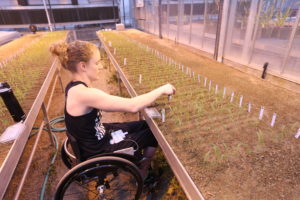Agronomy graduate student Shelby Gruss delivers on the court and in the fields
 Gruss works in the Horticulture and Landscape Architecture greenhouses and the Lilly Greenhouses. Her Ph.D. research focuses on better understanding why sorghum crops release Hydrogen Cyanide. (Photo by Tom Campbell)
Gruss works in the Horticulture and Landscape Architecture greenhouses and the Lilly Greenhouses. Her Ph.D. research focuses on better understanding why sorghum crops release Hydrogen Cyanide. (Photo by Tom Campbell) The average student will entertain a few qualms about a decision to pursue a Ph.D., a commitment that severely tests mental, and sometimes physical, capabilities. Even Purdue agronomy graduate student Shelby Gruss, no stranger to adversity, says she harbored her fair share of doubts when she decided to pursue a Ph.D. in genetics and plant breeding.
Gruss was a senior in high school when a snowboarding accident left her permanently paralyzed from the waist down. Although she thrived in college at the University of Illinois and has distinguished herself as an athlete, Gruss admits she wasn’t sure if her condition would allow her to complete the fieldwork and physical tasks necessary to pursue a Ph.D. in her chosen field.
“There were a couple of times I just didn’t think it was going to work out for me, that I might have to choose another route,” Gruss says.
As it turns out, however, she didn’t need to worry. Since coming to Purdue, Gruss says she’s found support at every turn.
Gruss is working with Mitch Tuinstra, professor of plant breeding and genetics, to better understand Dhurrin, a compound found in sorghum, which releases Hydrogen Cyanide when broken down. Ultimately, the work could help make the leaves of the crop, which contain the Hydrogen Cyanide, safer for forage cattle and humans. Her research does require extensive time in the field but her adviser and his other students are conscientious, more than willing to create ways to facilitate her research and fieldwork.
“Typical rows aren’t wide enough for a wheelchair to go down and it can be difficult to reach corn tassels or other plants,” Gruss explains. “Corn is pretty tall and sorghum can be even taller.”
So, in fields where she conducts research, row crops are planted further apart than normal to ensure Gruss has room to maneuver. Purdue and her department also arrange access to adaptive farming technologies.
“They’re currently helping me get the necessary equipment. Everyone has been so accepting and willing to help,” Gruss says.
Gruss is entering the second year of her Ph.D., so the fieldwork component of her studies is only going to increase. It’s odd, she contemplates, how something she thought would be prohibitive is one of the aspects of her degree she enjoys the most. “Sometimes it can get a little hot, a little tedious, but I just enjoy being outside,” Gruss adds.
Gruss finds the key to graduate school success is maintaining that elusive work-life balance. She has been an avid basketball player since shortly after her accident and plays for the University of Illinois’ wheelchair basketball league. She was also selected to captain Team USA’s team at the International Wheelchair Basketball Federation’s World Championship this August. Her basketball workouts, which Gruss undertakes alone on Purdue’s recreational sports center courts, are what help keep her in peak mental and physical condition.
“Basketball is my go-to. A lot of Ph.D. students feel like you have to work constantly but you need an outlet. You need to hit deadlines but you also need to take a breather,” Gruss says.
And somewhere between basketball and graduate school, Gruss also finds time for her friends, family, and her dog, Sadie. She’s up at 5 a.m. every day to exercise Sadie before heading to the gym and then the lab, the field, the classroom, or, sometimes, all three. The rest of the day is devoted to research and coursework unless it’s Thursday, which is Schooner Night at Gruss’ preferred Lafayette bar, Chumley’s.
Gruss isn’t sure what she wants to do with her degree yet, although she’s leaning towards working in the private sector or communications. She enjoys demystifying the scientific process for media and the public. Additionally, she hopes her journey will clarify the Ph.D. experience for students with limited mobility that may come after her.
“Anything I can do to pave the way I will do it,” Gruss says. “It’s been really great, but hopefully it will be even easier for the next person.”






